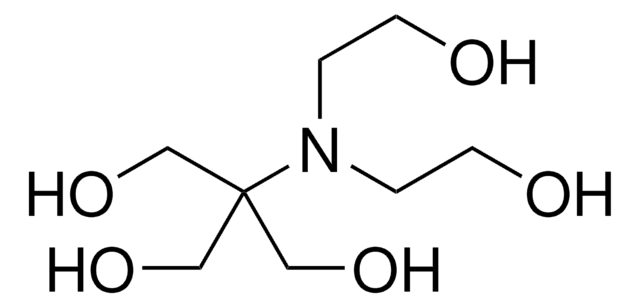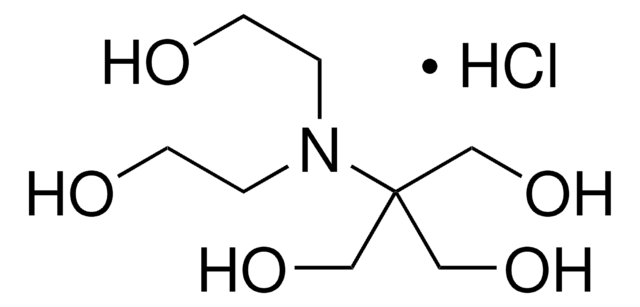14879
BIS-TRIS
BioUltra, ≥99.0% (NT)
Synonym(s):
2,2-Bis(hydroxymethyl)-2,2′,2″-nitrilotriethanol, 2-Bis(2-hydroxyethyl)amino-2-(hydroxymethyl)-1,3-propanediol, Bis(2-hydroxyethyl)amino-tris(hydroxymethyl)methane
About This Item
Recommended Products
product line
BioUltra
Quality Level
Assay
≥99.0% (NT)
form
powder
impurities
insoluble matter, passes filter test
ign. residue
≤0.3%
loss
≤0.5% loss on drying, 20 °C (HV)
pH
9.5-11.0 (25 °C, 1 M in H2O)
useful pH range
5.8-7.2
pKa (25 °C)
6.5
solubility
H2O: 1 M at 20 °C, clear, colorless
anion traces
chloride (Cl-): ≤50 mg/kg
sulfate (SO42-): ≤50 mg/kg
cation traces
Al: ≤5 mg/kg
As: ≤0.1 mg/kg
Ba: ≤5 mg/kg
Bi: ≤5 mg/kg
Ca: ≤10 mg/kg
Cd: ≤5 mg/kg
Co: ≤5 mg/kg
Cr: ≤5 mg/kg
Cu: ≤5 mg/kg
Fe: ≤5 mg/kg
K: ≤50 mg/kg
Li: ≤5 mg/kg
Mg: ≤5 mg/kg
Mn: ≤5 mg/kg
Mo: ≤5 mg/kg
Na: ≤50 mg/kg
Ni: ≤5 mg/kg
Pb: ≤5 mg/kg
Sr: ≤5 mg/kg
Zn: ≤5 mg/kg
absorption
cut-off at 270 nm in H2O at 1 M
λ
1 M in H2O
UV absorption
λ: 280 nm Amax: 0.1
SMILES string
OCCN(CCO)C(CO)(CO)CO
InChI
1S/C8H19NO5/c10-3-1-9(2-4-11)8(5-12,6-13)7-14/h10-14H,1-7H2
InChI key
OWMVSZAMULFTJU-UHFFFAOYSA-N
Looking for similar products? Visit Product Comparison Guide
Application
Other Notes
Signal Word
Warning
Hazard Statements
Precautionary Statements
Hazard Classifications
Eye Irrit. 2
Storage Class Code
11 - Combustible Solids
WGK
WGK 2
Flash Point(F)
Not applicable
Flash Point(C)
Not applicable
Personal Protective Equipment
Regulatory Listings
Regulatory Listings are mainly provided for chemical products. Only limited information can be provided here for non-chemical products. No entry means none of the components are listed. It is the user’s obligation to ensure the safe and legal use of the product.
JAN Code
14879-INTR-F:
14879-BULK-F:
14879-100G-F:
14879-VAR-F:
14879-25G-F:
Certificates of Analysis (COA)
Search for Certificates of Analysis (COA) by entering the products Lot/Batch Number. Lot and Batch Numbers can be found on a product’s label following the words ‘Lot’ or ‘Batch’.
Already Own This Product?
Find documentation for the products that you have recently purchased in the Document Library.
Customers Also Viewed
Our team of scientists has experience in all areas of research including Life Science, Material Science, Chemical Synthesis, Chromatography, Analytical and many others.
Contact Technical Service




